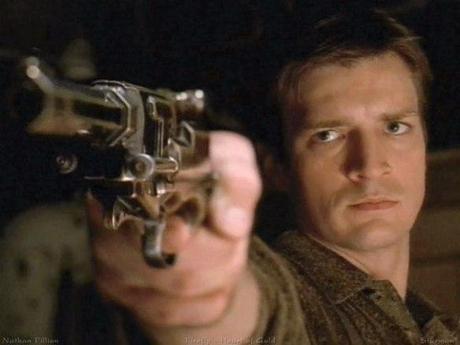Any fan of genre television probably has a mental list of dos and don’ts when it comes to pilots. With so many entries into the sci-fi category in the past few years, we’ve seen them all. You probably have your own. These are a few of my “dos.”

Mal Reynolds. Awesome. Not crazy.
1. Don’t overdo it on the exposition.
Nothing kills a pilot like heavy exposition, but there’s a little room for forgiveness with science fiction or supernatural settings. There’s simply more that needs explaining. Still, a long voice-over that tells us a bunch of information that we’re going to learn anyway, more organically, is a waste of time. The single episode of Delirium is the best recent example of this. In addition to boring the audience, the opening VO revealed a character much more mature and aware than the one who belonged to the voice. At the opposite end of the spectrum is the Orphan Black pilot, which left us saying “WTF”? In a good way.
2. Show, don’t tell.
Closely related to #1, showing us the way the world works interests us more, and demonstrates a confidence in our intelligence. In a show with cool, futuristic gadgets and vehicles, the coolness doesn’t need to be pointed out.
The pilot of Extant shows pieces of the characters’ daily routines. We get to see them using technology without anyone explaining, for the audience’s benefit, “This is how you use the interactive mirror.”
3. Watch your language.
Language evolves quickly, and who knows how we’ll be talking in 25—let alone 2,500—years? It’s safe to assume we won’t be talking like we do now. The possibilities for language give writers unfettered freedom. So having characters use contemporary slang and idioms doesn’t make sense. The 100 is guilty of this.
When dealing with time travel, this rule becomes further complicated. For example, if you bring a character from the past—a past that is known to the viewer—be careful to avoid having him say things he wouldn’t have in his own time. A transgression of this nature made me stop watching Resurrection, although said transgression didn’t occur in the pilot. A character who is supposed to have been dead for 10-15 years suddenly reappears. One of the first things we hear him say is, “Maybe I have amnesia. That’s a thing, right?” (I pause to place my face in my palm.) I don’t know the origin of the phrase “That’s a thing,” but I’m thinking How I Met Your Mother popularized it, and I know it wasn’t in use in rural Missouri a decade ago. Also, he would be fully aware of what amnesia is, so why would he even ask such as asinine question? Sheesh.
4, Use tropes well.
This could be a whole post, so I’ll try to keep things succinct. We expect certain tropes in pilots: the new person on the job/at school/in the neighborhood, for example. That one may be more important in science fiction than elsewhere, since it gives the writers a lot of room to explain the rules of the world. A solid variation is the character who just wakes up or returns from a journey with no knowledge of what’s happening (John Doe, The Last Ship).
A number of tropes can be used to introduce the all-important potential romance. Often in science fiction, the love story can feel tacked on (Falling Skies), so chose the right tropes to hint at who might hook up with whom, but don’t put it in skywriting. Tropes help us find our way in a new show; clichés dumb it down. Find the line. Stay behind it.
5. Monsters not required.
Monsters are great. A defined, scary-ass enemy sets up tension and excitement. But we don’t have to see the monster in the pilot to be excited about it. This might sound contradictory to #2 above, but an unseen enemy could be scarier. Revealing one too soon can come off as desperate. As an example of the latter, I give you The Strain. Granted, we’re talking Guillermo del Toro here, a master of monsters, and the special effects were amazing. Still, the parasite/vampire/grim reaper thing took me right out of the reality. Firefly, on the other hand didn’t have to show us a Reaver in the pilot to scare the hell out of us.
6. Make your hero flawed but not cray-cray.
This one is inspired by Almost Human, but I’ve seen it a lot. Nobody wants a goody two-shoes (Farscape) but when your protagonist throws his partner out of a moving car, whether or not that partner is a robot, you’re trying to hard. Speaking of Firefly, Whedonstrikes the perfect balance with Mal. There are all different flavors of mental instability on that boat, but the pilot shows us a Mal who’s strong but jaded, clear-headed but motivated. We see that he’s willing to go to extremes to protect his crew in Episodes 2 (“The Train Job”) and 9 (“Ariel”), but by then we’re well on our journey with him and his choices don’t take us out of the narrative.
What do you think? What makes a science fiction pilot sing?
